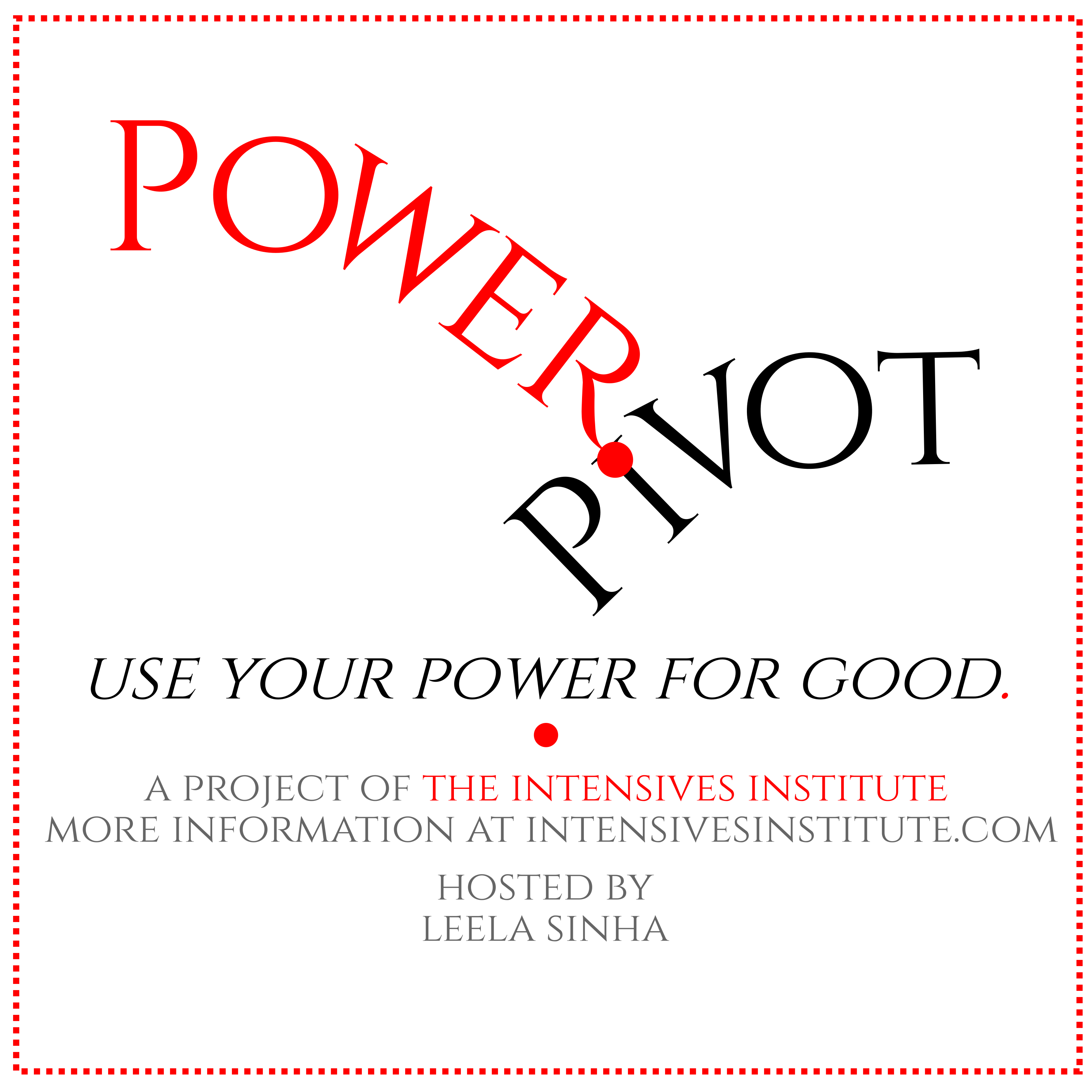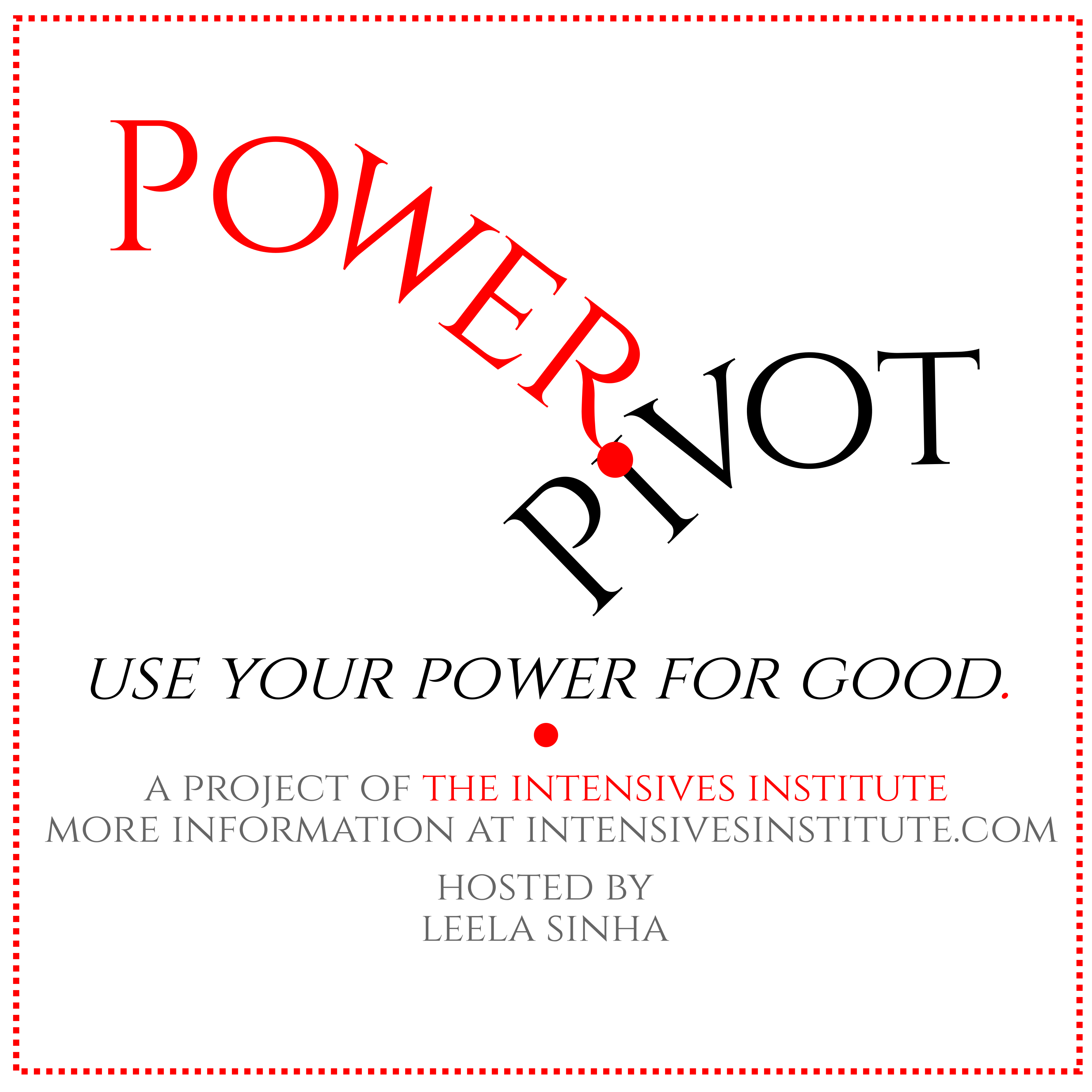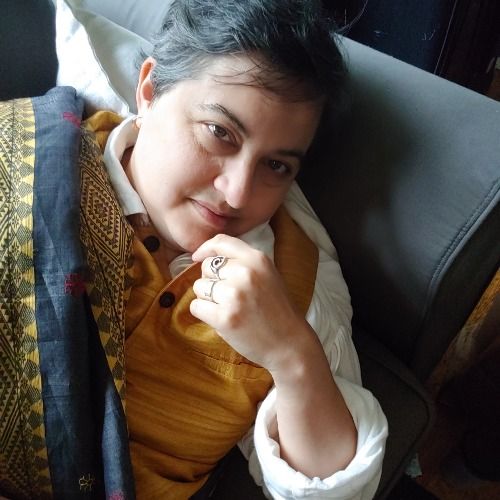Episode 3
It Matters to That One
…
Transcript
I know, that poem about the starfish is so
Leela Sinha:overrated. It's so over-told. Time after time, about the kid
Leela Sinha:and the starfish and walking down the beach. And how can you
Leela Sinha:get all the starfish? And it made a difference to that one.
Leela Sinha:And when we come into business, it's even more like that. People
Leela Sinha:are walking around talking to us while we pick up starfish
Leela Sinha:telling us, "You can't, you can't pay attention to the
Leela Sinha:starfish, you can't get the starfish back in the sea,
Leela Sinha:there's so much to catch. There's so much to do. There's
Leela Sinha:so many castles to build, holes to dig, and you can't possibly
Leela Sinha:rescue all the starfish and do everything else." And anyway,
Leela Sinha:there's so many starfish, there's always another starfish,
Leela Sinha:there's always more, there's always more to do, there's
Leela Sinha:always more you could be better. That is the cacophony that we
Leela Sinha:are surrounded by. And I do mean cacophony. When I first came
Leela Sinha:into business, I came from parish ministry, which is a heck
Leela Sinha:of a transition, going from a business, a work, a calling,
Leela Sinha:that isn't supposed to be about business at all, where marketing
Leela Sinha:is a bad word. Where somehow people are supposed to magically
Leela Sinha:appear on the doorstep, and be dedicated, intrigued, engaged,
Leela Sinha:where people are supposed to love it, because of what it is,
Leela Sinha:for its essence. Coming from that to a business, where 90% of
Leela Sinha:it is marketing. At least 90% of it is marketing, it could be
Leela Sinha:more. At the beginning, it's all marketing, you barely have
Leela Sinha:enough time or energy to create the product that you're trying
Leela Sinha:to sell, because you're too busy trying to sell people on it. But
Leela Sinha:if you don't sell people on it, you won't have the resources
Leela Sinha:that you need to create the thing. And if you can't create
Leela Sinha:the thing that you need the resources to create, then you
Leela Sinha:don't have a business at all. You've got to buy and sell and
Leela Sinha:do everything all at once and stay up late nights coding or
Leela Sinha:writing copy or developing that product that you're selling
Leela Sinha:during the day when other people are awake. And for what? Like
Leela Sinha:for why? Well, because you have an idea. You have an idea, you
Leela Sinha:have a plan. You have a something. You have a something,
Leela Sinha:a spark, and it won't let go. And maybe that spark is just
Leela Sinha:that. You want to sell a thing that will make some money so
Leela Sinha:that you can be wealthy so you can take care of somebody so you
Leela Sinha:can.... But a lot of times it's more than that. For most of us,
Leela Sinha:it's more than that. For most of us, there's some element of "I
Leela Sinha:want to run a business, that's a good business, I want to be an
Leela Sinha:honorable business person." I relate to Santa in 'Miracle on
Leela Sinha:34th Street'. I want to be the person who's so strong and
Leela Sinha:confident and well-off that I can send people down the street,
Leela Sinha:if what I have is not what they're looking for. That's how
Leela Sinha:I want to be in business. And what I want to be offering
Leela Sinha:people in this business is something that they actually
Leela Sinha:need, not a widget that will gather dust. Not a course that
Leela Sinha:doesn't tell them anything they didn't already know. I want to
Leela Sinha:to bring them from here to somewhere else. I want to carry
Leela Sinha:them on a journey. I want to accompany them, I want to
Leela Sinha:transform them. I want to transform their life. Even if
Leela Sinha:it's just by having the perfect shower scrubber. Sometimes you
Leela Sinha:need the perfect shower scrubber.
Leela Sinha:Sometimes it's by bringing a whole new way of cooking into
Leela Sinha:residential kitchens. Sometimes, sometimes it's by taking care of
Leela Sinha:people one person at a time. Sometimes it's by figuring out
Leela Sinha:how to take care of people more than one person at a time.
Leela Sinha:Because taking care of one person at a time is actually not
Leela Sinha:enough because there are too many people who need too much
Leela Sinha:care and it's not their fault and they're not doing anything
Leela Sinha:wrong, but we got to get more care out to more people and we
Leela Sinha:only have so many skilled and trained caregivers. And so how
Leela Sinha:are we going to give care on a larger scale? How are we going
Leela Sinha:to reach more people? How are we going to give people the
Leela Sinha:baseline tools that they need to get to the point where working
Leela Sinha:one-on-one is actually a valuable experience, or maybe
Leela Sinha:working one-on-one is valuable, so valuable that we have to
Leela Sinha:create a way for everybody to have that one-on-one witnessing
Leela Sinha:experience. How are we going to do that? Solving for the unknown
Leela Sinha:variable, or set of variables, is the lifeblood of a lot of
Leela Sinha:entrepreneurship- not all of it. Sometimes people are just
Leela Sinha:building a better mousetrap. But sometimes, often, we're here
Leela Sinha:because we want the world to be a better place. And we're pretty
Leela Sinha:sure we're pretty sure that if we could do the thing, and get
Leela Sinha:people to understand why the thing is helpful and important,
Leela Sinha:if we could do all of that, then they would have better lives.
Leela Sinha:And it doesn't hurt that we would do. Not only because we
Leela Sinha:might make enough of a profit to pay our bills, and go home and
Leela Sinha:save some up and buy a house and a car and take care of our
Leela Sinha:families. But also, because our work will have meaning. Meaning
Leela Sinha:making is one of those things that's gotten largely handed off
Leela Sinha:from the religious world to the business world as more and more
Leela Sinha:people spend more and more time at work. And so it matters, why
Leela Sinha:we do what we do. And it matters what we're doing. It matters
Leela Sinha:what the end goal is, it matters what the impact is, all of it
Leela Sinha:matters. And so why do we do this thing, where we walk down
Leela Sinha:the beach, and everyone is telling us that we've got to
Leela Sinha:build more castles, we've got to dig more holes. And we're
Leela Sinha:building castles and we're digging holes, and we're raking
Leela Sinha:up various things out of the sand and looking at them and
Leela Sinha:admiring them and maybe putting them back or maybe tucking them
Leela Sinha:in the trash bag that we're carrying along with us. And
Leela Sinha:we're throwing those starfish back in the water. We're
Leela Sinha:throwing the starfish back in the water, and we don't see it
Leela Sinha:as incidental. It's not like, "Oh, I'm here to dig holes, but
Leela Sinha:also I will throw this starfish back." It's "I'm here to dig
Leela Sinha:holes and throw starfish back." Of course, throwing starfish
Leela Sinha:back is a metaphor, and what we're doing depends on who we
Leela Sinha:are and how our businesses are shaped and where we're
Leela Sinha:positioned. We might be creating much better work environments, I
Leela Sinha:hope we're all creating much better work environments than
Leela Sinha:the standard average run-of-the-mill work
Leela Sinha:environment. We're being more flexible, we're treating our
Leela Sinha:employees like human beings. We care about our employees' kids
Leela Sinha:for real, not just, you know, in a line and a form letter that
Leela Sinha:goes out to everybody from the CEO once a year. We mean it, we
Leela Sinha:really do want them to be happy and healthy and succeed. We want
Leela Sinha:them to build wealth of their own, we want them, we want them
Leela Sinha:to work in a way that works best for them. And that works out
Leela Sinha:well for us too. It's good business, when your employees
Leela Sinha:are happy and working in their zones of genius. It's good
Leela Sinha:business, because then you get the best work out of them and
Leela Sinha:they're happy and they stay. And so you don't have to onboard
Leela Sinha:eleventy-million more people. And you don't have to go through
Leela Sinha:long interview processes. By the way, we do not need days and
Leela Sinha:weeks of interviews for these jobs. We don't need that much.
Leela Sinha:Let me just say, you're not going to learn more. You think
Leela Sinha:you will. But you're not going to learn more, you're not going
Leela Sinha:to prevent more mistakes, by interviewing people seven,
Leela Sinha:eight, ten times; you're not going to make things better,
Leela Sinha:you're not going to make them happier by making them keep
Leela Sinha:coming back and coming back and coming back and piling on the
Leela Sinha:stress and the homework problems. It's not-- no, no.
Leela Sinha:This was never the norm before. And it's a waste of resources, a
Leela Sinha:waste of time, a waste of energy. There are particular
Leela Sinha:things you can look for- intensiveness and expansiveness
Leela Sinha:that I talk about a lot. That's one of them. There are other
Leela Sinha:things you can look for that are important, but you're not going
Leela Sinha:to learn much more after the second or third interview.
Leela Sinha:Enough is enough. In fact, I just saw an article about one
Leela Sinha:organization that's paying people to interview. They pay
Leela Sinha:the people $75 to come and be interviewed because the time is
Leela Sinha:valuable and the people are worth honoring. And that's the
Leela Sinha:kind of thing I'm talking about. We're throwing the starfish back
Leela Sinha:each in our own way. But we keep doing it even when everybody
Leela Sinha:says everybody says that that's not how you run a good business
Leela Sinha:and the reason we keep doing it the reason it's so important is
Leela Sinha:because it's not a side-gig. Starfish are not a side-gig.
Leela Sinha:Starfish are integral to the beach. And so helping the
Leela Sinha:starfish live is part of what we do. It is why we are here; we
Leela Sinha:are as much here to build widgets or create personal
Leela Sinha:transformation, as we are here to save the starfish. We are
Leela Sinha:here to throw starfish back in the water. And so nobody, nobody
Leela Sinha:who says that that's not a thing you can do, understands what
Leela Sinha:we're doing. I used to have a little card on my desk that said
Leela Sinha:"those that say it cannot be done should not interrupt the
Leela Sinha:person doing it." My business is about starfish but so is yours.
Leela Sinha:Where are you throwing starfish back in the water?


